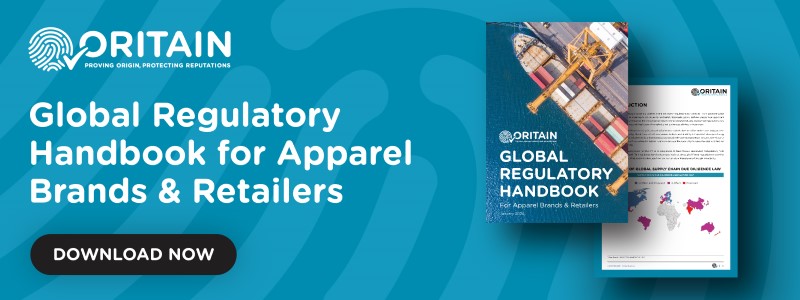Canada’s Modern Slavery Act: What Businesses Need to Know About Forced Labour Compliance
By Ana Hinojosa | 21 December 2023
minutes to read.

On May 11, 2023, the Canadian Parliament passed a significant piece of legislation, Bill S-211, also known as the Fighting Against Forced Labour and Child Labour in Supply Chains Act. Effective from January 1, 2024, this Act requires all Canadian companies to publicly disclose their efforts in identifying and eradicating forced labour and child labour from their supply chains.
Here’s everything you need to know about Canada's Forced and Child Labour Act and how to prepare to meet reporting obligations.
Defining forced labour and child labour
The Fighting Against Forced Labour and Child Labour in Supply Chains Act defines “forced labour” as a labor or service provided by a person under circumstances where they could reasonably believe that their safety or the safety of someone known to them would be at risk if they failed to provide the labor. This also includes any situation that constitutes forced or compulsory labour as defined by the Forced Labour Convention, 1930.
The Act defines “child labour” as labour or services provided or offered by persons under the age of 18 years, which either:
- Are contrary to the laws applicable in Canada,
- Occur under circumstances that are mentally, physically, socially or morally dangerous to them,
- Interfere with their schooling, either by depriving them of the opportunity to attend school, obliging premature school departure, or requiring them to juggle schooling with excessively long and heavy work,
- Or constitute the worst forms of child labour as defined in the Worst Forms of Child Labour Convention, 1999.
What is the purpose of the Act?
The main goal of this Act is to uphold Canada’s commitment to the fight against forced labour and child labour by introducing mandatory reporting obligations on:
- Government institutions engaged in the production, purchase, or distribution of goods within Canada and internationally; and
- Private entities involved in producing goods within Canada; as well as those importing goods that are produced outside of Canada.
Who does the Act apply to?
The legislation applies to government institutions and non-governmental entities, which include corporations or unincorporated organizations that meet the following criteria:
- Listed on the stock exchange in Canada; or
- Has a place of business in Canada, do business in Canada or have assets in Canada and meets two or more of the following conditions:
- $20 million or more CAD in assets
- $40 million or more CAD in revenue
- 250 or more employees
The Act also applies to all government agencies involved in producing, purchasing, or distributing goods.
Canada’s Modern Slavery Act reporting requirements
All the affected businesses must submit an annual report detailing their efforts to combat forced and child labour. This report, accessible to the public, will require comprehensive information, including:
- Steps taken to prevent and reduce risks throughout the supply chain, including supplier audits, risk assessments, and implementation of ethical sourcing policies.
- A clear picture of the business structure, activities, and supply chains. Transparency is key, and businesses must map out their entire operations to identify potential vulnerabilities.
- Policies and due diligence processes to assess and address labour risks.
- Risk assessment and management strategies to identify high-risk areas and implement targeted mitigation measures.
- Measures taken to remediate any instances of forced or child labour. This includes addressing past issues and supporting affected workers.
- Training provided to employees on forced and child labour.
- Methods for assessing the effectiveness of implemented measures.
The report must be certified and signed by one or more members of the business's governing body and submitted to the Minister of Public Safety and Emergency.
Deadlines, penalties and consequences for non-compliance
The first report filing deadline is May 31, 2024. Failing to comply or submitting false information carries hefty consequences, including:
- Financial penalties
- Legal rulings
- Reputational damage
These include fines of up to $250,000 CAD, criminal liability for businesses and their directors/officers, and potential legal action from third parties.
This legislation shares a similar scope to Australia’s Modern Slavery Act, reflecting the global movement toward combatting exploitative labour practices. However, while Canada's law provides a direct border enforcement tool, Australia's relies more on corporate transparency and public pressure to drive compliance.
How businesses can comply with Canada’s Modern Slavery Act
Without a holistic plan, many fashion brands and retailers risk falling short of meeting the requirements of the new legislation. To ensure forced labor compliance, companies must take urgent steps, including:
- Conducting a thorough risk and readiness assessment to identify vulnerabilities and prioritize areas for improvement.
- Reviewing best practices and benchmarking against industry leaders to accelerate the implementation of effective due diligence processes.
- Developing a comprehensive due diligence program that covers supplier vetting, on-site audits, monitoring mechanisms, and grievance procedures.
- Engaging with suppliers and building collaborative relationships through open communication and joint efforts to tackle shared challenges.
- Focusing resources and attention on high-risk areas and products, prioritizing sectors and geographies with a higher prevalence of forced and child labor.
Businesses addressing these steps will better position themselves to tackle the many compliance trends shaping the fashion industry. This also benefits businesses in strengthening ESG reporting and brand trust.
Supply chain transparency
Improving supply chain transparency is important for complying with Canada's forced labour law because it allows companies to identify and address the risks of forced labour within their operations and supply chains.
By mapping their supply chains and knowing their suppliers, businesses can proactively prevent the importation of goods made with forced labour, which is a key requirement of the law. Without this visibility, companies would be unable to demonstrate due diligence and would face potential penalties for non-compliance.
Oritain uses high-precision forensic science and data to help brands and suppliers build transparency and trust across their fashion and cotton supply chains. By verifying products and raw materials back to their origin, we help support compliance and protect business reputation.
When you partner with a global scientific traceability leader like Oritain, you are better positioned to fulfill due diligence obligations and meet the reporting requirements of Canada's Forced Labour Act.
Oritain takes a forensic approach to compliance, helping businesses meet their obligations with scientific precision.
We are here to help you in evaluating the potential impact of Canada’s new Act on your business and provide guidance on compliance. For more information, please get in touch with us.
Disclaimer: The information provided in this document does not and is not intended to constitute legal advice. Instead, all information presented here is for general informational purposes only. Counsel should be consulted with respect to any particular legal situation.





